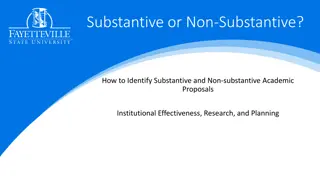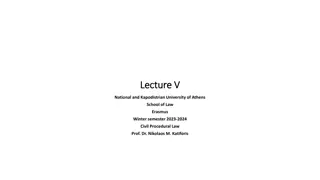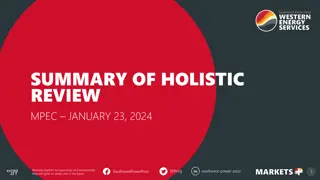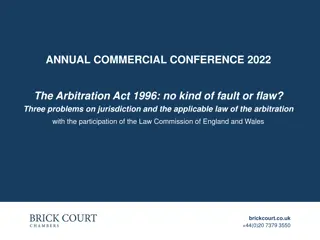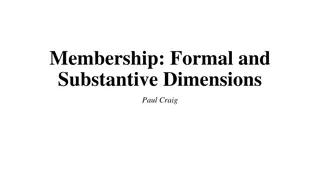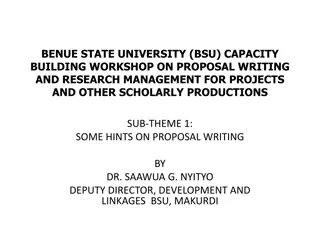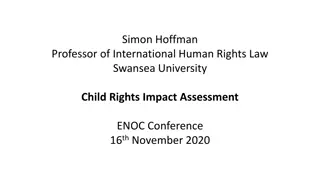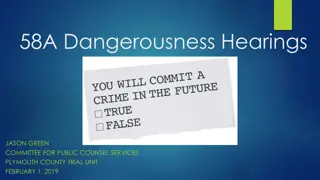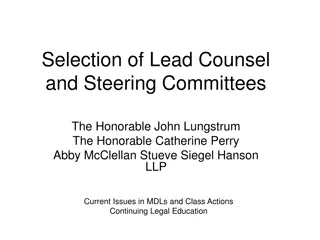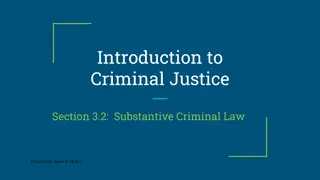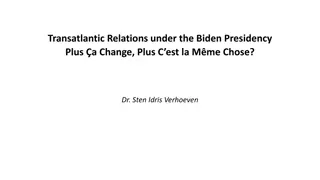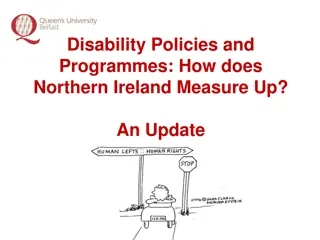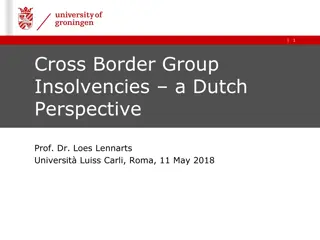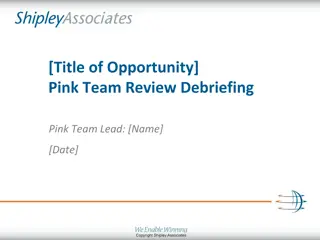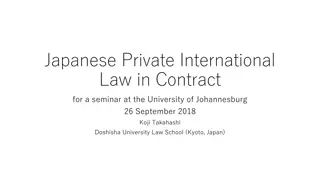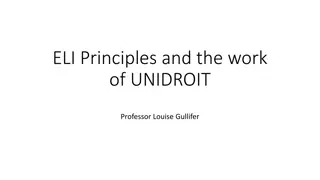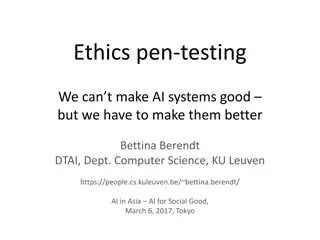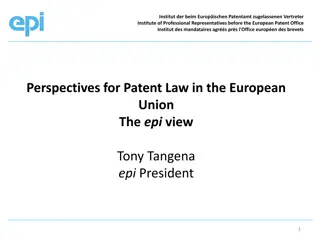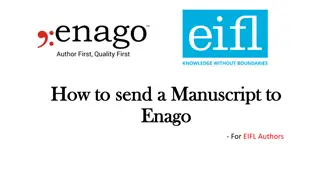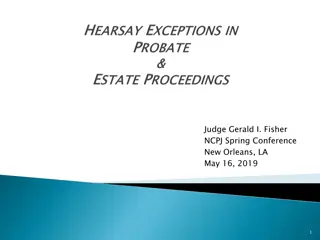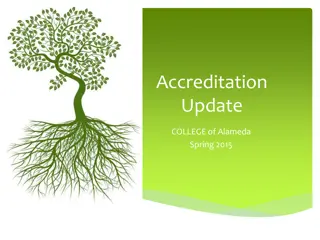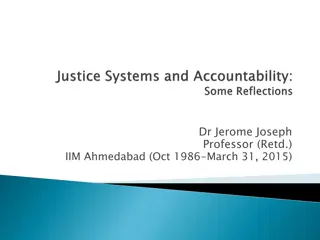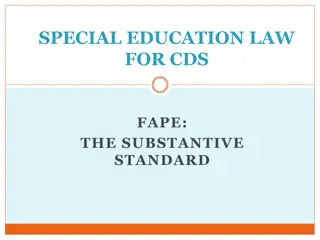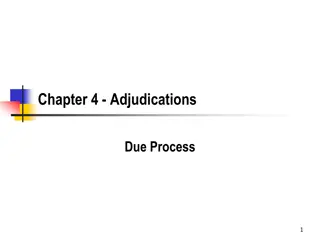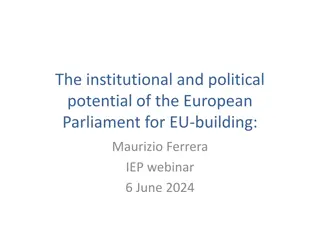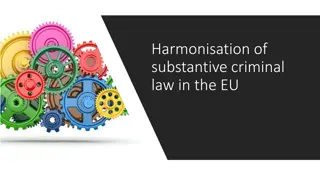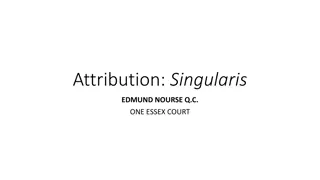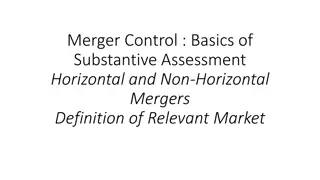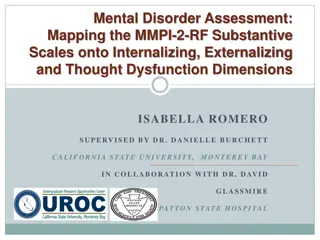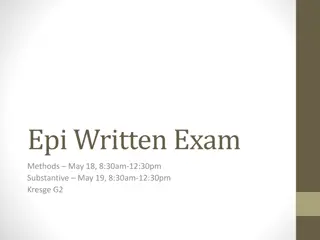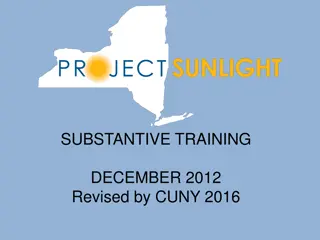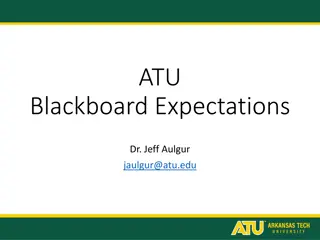2023 Annual Reporting Webinar: Guidelines & Deadlines
Join the webinar for Public Health Programs on Oct 3, 2023, to learn about submitting annual reports. Explore account setup, questionnaire walkthrough, and Q&A sessions. Review general guidelines for reporting and submission deadlines. Ensure accurate reporting for SPH/PHP programs in the reaccredit
2 views • 43 slides
Integrated Improvement Plan 2023-2024
The Integrated Improvement Plan 2023-2024 focuses on establishing stable leadership and governance structures, enhancing communication and engagement efforts, and implementing quality improvement methodologies. Key milestones include filling substantive executive leadership positions, developing gov
0 views • 13 slides
Overview of EU Criminal Law: Classes, Exam, and Directives
This content provides detailed information on substantive and procedural aspects of EU Criminal Law, covering classes, terms of participation, exam details, and specific directives. It includes guidelines on passing the classes through active participation, presentations, and exams. The schedule out
3 views • 13 slides
Identifying Substantive and Non-Substantive Academic Proposals
Learn how to distinguish between substantive and non-substantive academic proposals in institutional effectiveness, research, and planning. Discover the criteria and processes for identifying these proposals, including which ones require specific approvals and reviews from academic committees. Gain
0 views • 23 slides
Proceedings for Provisional Remedies in Civil Procedural Law
Greek legal theory distinguishes between conservatory and regulatory provisional remedies to secure substantive rights or provisionally arrange disputed situations. These remedies are constitutionally guaranteed and granted under specific substantive and procedural conditions. The procedure involves
0 views • 14 slides
Summary of Holistic Review of MPEC Tariff
Provide a summary of the holistic review conducted by SPP Staff on the MPEC Tariff, covering both non-substantive and substantive changes made for review and approval by MDWG. The review includes critical dates, tariff outline, updates from working groups/task forces, and a detailed table of content
0 views • 11 slides
Harmonisation of Substantive Criminal Law in the EU
The Treaty of Lisbon serves as a legal foundation for the harmonisation of substantive criminal law within the European Union. It establishes the basis for judicial cooperation, mutual recognition of judgments, and approximation of laws across Member States. The treaty allows for the establishment o
2 views • 60 slides
Annual Commercial Conference 2022: Challenges in Arbitration Jurisdiction
The Annual Commercial Conference 2022 focuses on the Arbitration Act of 1996, exploring challenges and nuances in jurisdiction and applicable laws. The event features distinguished speakers and panelists discussing key issues related to substantive jurisdiction challenges in arbitral proceedings.
1 views • 18 slides
Dimensions of Membership in the European Union
The formal and substantive dimensions of membership in the European Union are outlined, including the criteria for accession and withdrawal. Formal criteria involve unanimity, consent of the European Parliament, and ratification of agreements, while substantive requirements focus on a state's commit
0 views • 22 slides
Legal Education and Judicial Ethics Seminar - Transforming Legal Cultures
Enhance your understanding of the CPR overriding objective and its interpretative mandates in the legal context. Explore concepts of substantive and procedural justice, principles of proportionality, and the judicial oath of office. Delve into the Supreme Law of the Bahamas, right to protection of t
0 views • 54 slides
Effective Proposal Writing: Key Strategies for Securing Funding
Proposal writing is essential in academia for securing funding. This workshop at Benue State University shed light on the importance of persuading reviewers and addressing unspoken needs of funding agencies. Key elements such as conceptual innovation, methodological rigor, and rich substantive conte
1 views • 21 slides
Understanding Child Rights Impact Assessment (CRIA) in Policy Making
Child Rights Impact Assessment (CRIA) is a crucial procedure recommended by the UN Committee on the Rights of the Child to predict the impact of policy proposals on children's human rights. This assessment helps in identifying policy alternatives that are more consistent with child rights, involving
0 views • 4 slides
Understanding Dangerousness Hearings Under G.L. c.276, 58A
This content delves into the legal framework surrounding dangerousness hearings in Massachusetts, particularly under G.L. c.276, 58A. It covers the types of charges that warrant such hearings, when and where they can be initiated, historical development of the statute, and the constitutional princip
0 views • 19 slides
Best Practices for Selecting Leadership in Complex Litigation
Determining the appropriate leadership structure in complex litigation, including selecting lead counsel, liaison counsel, steering committees, and more, is crucial for case management. Factors to consider include the nature of claims, number of cases, and complexity of interests involved. Various c
0 views • 17 slides
Understanding Substantive Criminal Law in the American Legal System
Substantive criminal law encompasses the definition of criminal acts and penalties, with a core principle being that there can be no crime without a corresponding law. The American legal system follows the Rule of Law, ensuring that all individuals are subject to legal governance. Constitutional lim
0 views • 22 slides
Transatlantic Relations under the Biden Presidency: Continuity or Change?
Amid the tumultuous Trump presidency, transatlantic relations faced challenges with a focus on economic issues, NATO, and global engagement. The election of Joe Biden brought hope for a revival in these relations, aligning with Europe's anticipation for a renewed partnership. This article explores w
4 views • 16 slides
Monitoring Disability Policies and Programmes in Northern Ireland
In this update on disability policies and programmes in Northern Ireland, the focus is on measuring progress against the UN Convention on the Rights of Persons with Disabilities (UNCRPD). The report discusses substantive shortfalls, the role of the UNCRPD, the rights it protects, implementation and
0 views • 41 slides
Dutch Perspective on Cross-Border Group Insolvencies
This presentation by Prof. Dr. Loes Lennarts explores the Dutch perspective on cross-border group insolvencies, highlighting the lack of specific provisions in Dutch law for group insolvencies and the introduction of the draft Act on Court Confirmation of Extrajudicial Restructuring Plans (WHOA). Th
0 views • 30 slides
Pink Team Review Debriefing Summary and Action Plan
Pink Team recently conducted a comprehensive review debriefing, highlighting key findings, detailed insights, recommendations, and action items. The team aims to enhance product quality by effectively relaying findings to the proposal team, implementing action items, and achieving substantive improv
0 views • 8 slides
Understanding Substantive Information in ODR Platforms
Explore two types of substantive information regarding small claims and debt claim cases, including definitions, sources, and relevant statutes in Texas. Gain insights into the legal processes and resources available for handling such cases effectively.
1 views • 13 slides
Japanese Private International Law in Contract Overview
Japanese private international law in contract covers capacity, formation, substantive validity, effects, and extinction of contracts, with a focus on party autonomy and the law of the country most closely connected to the contract. The seminar at the University of Johannesburg presented key princip
0 views • 17 slides
A Comparison of ELI and UNIDROIT Principles on Digital Assets
A comparison between the principles of Electronic Liability Initiative (ELI) and the International Institute for the Unification of Private Law (UNIDROIT) regarding digital assets. ELI focuses on security over digital assets, while UNIDROIT covers a broader range, including transfers, custody, and m
0 views • 5 slides
Changes in CPD Audit Cycle for Medical Radiation Technologists
The Medical Radiation Technologists Board has proposed changes to the audit cycle for practitioners' Continuing Professional Development (CPD). The new biennium cycle will align CPD to a calendar year, with audits conducted every two years. Practitioners must meet minimum CPD hours and ensure 60% of
0 views • 4 slides
Ethics Pen-Testing for AI Social Good
A proposal to use ethics pen-testing to enhance AI systems for social good. Addressing questions on defining social good, roles of knowledge, potential side-effects, and striving to improve. Exploring the concept of social good in terms of substantive and procedural aspects. Advocating for an advers
0 views • 19 slides
Future Perspectives for EU Patent System: Granting and Litigation Systems
The future of the EU patent system envisions a high-quality, centralized Granting System under the European Patent Office (EPO) for substantive examination and granting. Coordination with National Patent Offices (NPOs) and European Patent Institute (epi) is key to stimulate inventions and provide ac
2 views • 8 slides
Enago Manuscript Submission Process for EIFL Authors
Learn how to easily submit your manuscript to Enago for editing services tailored for EIFL authors. Follow the step-by-step guide from uploading your files to receiving the final edited document. Take advantage of various service levels, including the highly recommended Substantive Editing, and get
0 views • 8 slides
Understanding Rulemaking and Regulations
Rulemaking is the process by which agencies create rules and regulations to implement or interpret laws. It can have the same effect as statutes passed by legislatures. This modern process, encouraged by federal courts, aims to simplify litigation. Rules are statements with general applicability tha
0 views • 22 slides
Understanding Hearsay Rules and Exceptions in Legal Proceedings
Hearsay evidence, which is an out-of-court statement introduced for the truth of its content, is considered less reliable in court due to factors like lack of oath, inability to see demeanour of declarant, and absence of cross-examination. Various historical judgments and legal exceptions allow cert
0 views • 90 slides
Accreditation Process at College of Alameda: A Comprehensive Overview
Peer review is integral to the accreditation process at College of Alameda, involving periodic review and revision of standards. The timeline outlines key events from the initial self-evaluation to the final accreditation commission meeting. A visiting team of peers from community colleges will asse
0 views • 13 slides
Perspectives on Rationality and Management Practices
Explore the concepts of practical, theoretical, formal, and substantive rationality along with perspectives on management practices like Hierarchical-Control-Coercive and Empowered-Collegial-Consensus. It delves into Dr. Jerome Joseph's expertise and provides a comprehensive view of rational decisio
0 views • 20 slides
Understanding Special Education Law for Children with Disabilities (CDS)
Special Education Law for Children with Disabilities (CDS) emphasizes the FAPE standard, IDEA process, and FAPE requirements such as procedural aspects, substantive standards, and the provision of meaningful educational benefits. Court cases like Rowley (1982) and Endrew F. (2017) have shaped the im
0 views • 27 slides
Exploring Due Process: Substantive and Procedural Dimensions
Dive into the intricacies of substantive and procedural due process, understanding the limits on government regulation and the significance of fair procedures in affecting individual rights. Explore the evolution of due process from historical perspectives to modern interpretations, reflecting on it
1 views • 27 slides
The European Parliament's Role in EU-Building: Analysis and Perspectives
The European Parliament plays a crucial role in the EU decision-making process through co-legislation procedures and the election of the Commission President. Despite some weaknesses, it is gaining political salience and influence, serving as a key accountability body for EU leaders. The Parliament
0 views • 10 slides
Harmonisation of Substantive Criminal Law in the EU: Treaty of Lisbon
The Treaty of Lisbon provides a legal basis for the harmonisation of substantive criminal law in the European Union through mutual recognition of judgments and directives establishing minimum rules for defining criminal offences and sanctions. Areas of crime covered include terrorism, human traffick
0 views • 45 slides
Understanding Company Attribution Rules in Legal Proceedings
Company attribution rules in legal proceedings are outlined, focusing on primary rules found in a company's constitution, general principles of agency, and exceptions where traditional attribution methods may not apply. The interpretation of laws involving companies and the application of specific a
0 views • 7 slides
Substantive Assessment of Mergers: Horizontal vs. Non-Horizontal
The substantive assessment of mergers involves evaluating whether a concentration significantly hinders effective competition. Horizontal mergers occur between undertakings in the same market, potentially reducing consumer choices. Non-horizontal mergers, such as vertical or conglomerate mergers, ha
1 views • 13 slides
Understanding the MMPI-2-RF Substantive Scales for Mental Disorder Assessment
This research explores mapping the MMPI-2-RF substantive scales onto internalizing, externalizing, and thought dysfunction dimensions in mental health assessment. The study emphasizes the importance of validating assessments for accurate clinical pictures and effective treatment planning. It delves
0 views • 17 slides
Doctoral Methods and Substantive Exams Overview
Doctoral students will take two exams, Methods on May 18 and Substantive on May 19. Methods exam has 3 questions focusing on Causal Inference, Study Design, Data Analysis, graded out of 6. Substantive exam covers 12 areas of interest with 2 questions each, except for Epi Methods. Passing grade is 7
0 views • 8 slides
Understanding Project Sunlight: Substantive Training Overview
Project Sunlight is an essential tool for transparency in New York State government interactions. The training emphasizes the need for recording appearances that involve covered individuals in various subject areas. It defines appearances and outlines what interactions should be documented, stressin
0 views • 22 slides
Understanding Regular and Substantive Interaction in Distance Education
Exploring the concept of regular and substantive interaction in the realm of distance education, this content delves into the importance of instructor-initiated interactions, meaningful engagement with students, and the impact on Title IV funding eligibility. It highlights the need for clear definit
0 views • 26 slides



